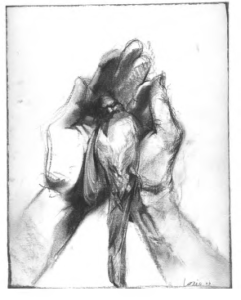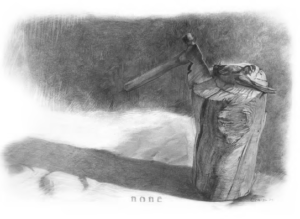—by Lauralee Farrer
When daylight wanes
and shadows lengthen,
to forgive is to make whole.
—None refrain
How beautiful this dappled, soft hour of light, and yet heartbreaking. Grey at the temples, the hour of None is melancholy, a time to ponder things we thought would always be with us. The loss of our plans, our parents, our pains have eroded confidence in the ability to conquer time. There is not much light left to the day to work or read or see by, nor to the seasons of our lives. Mortality is undeniable, and even those who are most ambitious—or deepest in denial—must admit time is short before winter. A lonely hour, None is when monks pray alone in their cells for a holy death. We crave contact with something transcendent at this time of day precisely because temporal things are dissolving into shadow. None is the second most populated hour at coffee houses,whether for stimulant or company, it hardly matters.Though natural to reflect on loss, Teilhard de Chardin urges hopeful patience: “Only God could say what this new spirit gradually forming within you will be. Give our Lord the benefit of believing that His hand is leading you, and accept the anxiety of feeling yourself in suspense and incomplete.” Suspense is natural to this, the ninth hour, when even Jesus Christ cried out to God “why hast thou forsaken me?” Receiving no answer, He sighed, “it is finished,” and breathed His last. Perhaps the torpor common to this time of day is a soul-memory of that black hour marking the death of our Savior.
The None hour is an hour of sleepy prayer,when the light plays among the shadows it creates and we are haunted by old dreams. Poet Henry David Thoreau’s oft-quoted sentiments become our standard of judgment: “I wanted to live deep and suck out all the marrow of life, To put to rout all that was not life and not, when I had come to die, discover that I had not lived.” This is the hour that tests determinations such as these, and the gentle challenge of None is not to give up, for there is time left. Now, at the hour when things that we have relied upon fail, first look to what endures: “Jesus Christ is the same yesterday and today and forever” (Hebrews 13:8). Trust is an important attribute of this hour.“Wait for the Lord; be strong, and let your heart take courage; wait for the Lord!” the Psalmist urges (27:14).
For some, None brings temptations to anxiety, of turning inward to critique and mourn lost youth, or worse, to try to recapture it. But this is a season to turn one’s mind toward legacies with eternal value: “The first and most basic task of the Christian leader in the future,” says Henri Nouwen in The Wounded Healer, “will be to lead his people out of the land of confusion and into the land of hope. Therefore, he must first have the courage to be an explorer of the new territory in himself, and to articulate his discoveries as a service to the inward generation.” So, the past may be transformed from failure into gift. South African leader Nelson Mandela, when asked upon his release from prison if he feared death, quoted William Shakespeare: “Cowards die many times before their deaths; the valiant never taste of death but once. Of all the wonders that I yet have heard, it seems to me most strange that men should fear; seeing that death—a necessary end—will come when it will come.” Embrace this, said Mandela, and you will “disappear under a cloud of glory.”
At this hour, we are urged to shift our thinking from what we have left unachieved to what we might yet leave behind, and to apply our energies to forgiveness and generosity. When the disciples criticized a woman who had lived a sinful life for pouring an expensive bottle of perfume on Jesus’ feet, He rebuked them with what is surely a strategy for facing eternity without fear: “For this reason I say to you her sins, which are many, have been forgiven, for she loved much” (Luke7:47 NAS). So then, in the day toward which we all journey, it may not be asked of us whether we sinned, but whether we loved.
illustrations by Denise Louise Klitsie
excerpted from Praying the Hours in Ordinary Life (Cascade Books, 2010)
follow our “None” tweets @praythehours




